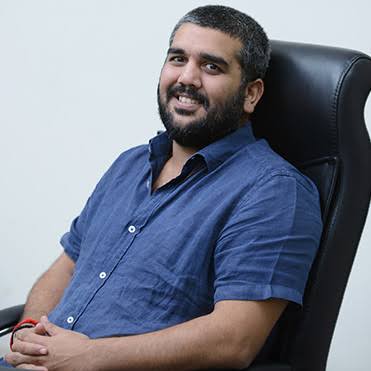News
Andrew Mwenda: Why Rajiv Ruparelia will continue to live in many peoples’ Memories for generations to come
On Saturday May 03 around 2.20am, fate struck. Rajiv Ruparelia, son of Uganda’s richest couple, Sudhir and Jyotsna Ruparelia, died in a horrible car accident. He was only 35 years. It was an accident of unparalleled disaster, a tragedy of unmitigated magnitude.
His car rammed into road barriers at Busabala, along the Kajjansi-Munyonyo highway, at high speed. The barriers are made of concrete, reinforced with steel. The car overturned, flew in the air for about 80 meters and crashed to the ground in a ball of fire. Both Rajiv and the car were burnt beyond recognition.
I knew Rajiv well, having met him when he was a teenager. His dad and mum are close friends to me. It is the one home, alongside that of security minister, Maj. Gen. Jim Muhwezi and his wife, Susan, that I frequent the most in Uganda. Sometime in 2007 in Kanyandahi, my mother introduced Sudhir to President Yoweri Museveni as her second born son. Since then, whenever Sudhir introduces me to his relatives, in-laws and friends who do not know me, especially when travelling abroad, he tells them that he is my brother and recites this story. So, Rajiv was a nephew to me even though, he, like his sister Sheena, calls me grandpa.
Rajiv was a fun-kid. He loved life and lived it to the fullest. He grew in wealth, loved to make money, yet he never sought a luxurious lifestyle. Except for his love for motorsport, which drove him to love expensive sports cars, the rest of his life was simple. He wore ordinary clothes, rode on bodas if there was too much traffic, went to ordinary clubs and bars and dealt with everyone without regard to their status. He laughed constantly and loudly and was happiest in the company of his friends. Life and money made meaning to him only when and if he enjoyed it with friends and family.
Yet despite his love of fun, Rajiv was also driven and passionate about the family business to which he devoted his enormous energy and talent. I witnessed this most especially when crooked officials in the Bank of Uganda sought to rob Crane Bank from the family and destroy Sudhir.
Rajiv joined the battle, and immediately took lead when he felt the father was hesitant. He understood the nature of the enemy, saw through their plans and intentions and braced himself to stop them. Working with unprecedented energy and skill, he investigated the matter, accumulated mountains of evidence, mobilized traditional and social media and went to battle. In trying to stop these crooks and bring them to book, Rajiv was willing to go to any length regardless of the consequences on him.
Whenever someone dies, the central question (for me) is: of what value has your life been? For religious people, life on earth is a very short transition to life eternal. But no one is certain about the hereafter. This could be the reason we fear death. Hence, despite its vicissitudes, life remains an attractive experience to treasure and hold onto. If there is no afterlife, then our presence on earth makes sense only if we leave behind a good legacy, actions and words that will remain in the memory of our fellow human beings.
It is here that Rajiv made his greatest mark in history. His family owns Victoria University. Sudhir bought the fledging university in 2013. By 2019, it was not making any progress. With only 194 students, the university was hemorrhaging $100,000 per month from other family businesses to sustain it.
That year, Sudhir appointed Rajiv to take charge of it. After that, Rajiv asked me to sit on the University Council. Our task was to turn the university into a self-sustaining institution. It is then that I watched, at first hand, Rajiv’s talents. He always had many business ideas bubbling in his head which he expressed with incredible clarity. But I had never witnessed him up close managing a business transition.
Victoria University had been positioned as an elite institution with high fees. Rajiv believed this was its undoing given the income level of Uganda. He selected a mixture of different talents to sit on the council and got the right group. Driving the council in constant meetings, we studied the fees’ structure, course units and other competitive elements of Ugandan universities. One day, when this process was complete, Rajiv called me and told me we need a new vice chancellor to drive the reform process. He sent me a CV of a one Dr. Lawrance Muganga, then a lecturer in Canada. He had been recommended to him by someone and wanted my opinion.
I was impressed by the CV and profile and told him so. Working with incredible energy and passion, he hired Lawrence immediately. Within weeks, the new vice chancellor arrived, took charge, and the business of transforming Victoria University began in earnest. Rajiv always thought outside of the box. He had a persistent desire to do same things differently, to break new ground. Since council had decided Victoria should be made a university for every Ugandan, Rajiv decided to use unorthodox means to present it so. He invited Bad Black and other such persons as brand ambassadors.
Some members of the council, including Sudhir, were appalled. How can we associate the university with such unsavoury characters? Friends called me to complain about this denigration. I am sometimes attracted to crackpot ideas, and I admired Rajiv’s energy, passion, conviction and drive.
Thus, despite my moral and professional doubts, I trusted Rajiv’s instincts and supported him fully. The university would break even at 900 students. Lawrence brought Conan Busigye to lead a marketing team. Yet within a year, Victoria University enrollment reached 3,000 students. Today, it has over 10,000 students and no longer a drain on the finances of the Ruparelia Group. It is the only school in Uganda that grew during COVID.
Rajiv has died. But he has left behind a great legacy, an institution that will live long and impact this country. This way, Rajiv has not died because he will continue to live through the memories of others, through the life, achievements and contribution of Victoria University in the life of Uganda. For his dad, mum, siblings, and little daughter, don’t forget this. If I was the one to decide, I would rename Victoria University, Rajiv Ruparelia Memorial University. It would be the most appropriate name
Comments



















